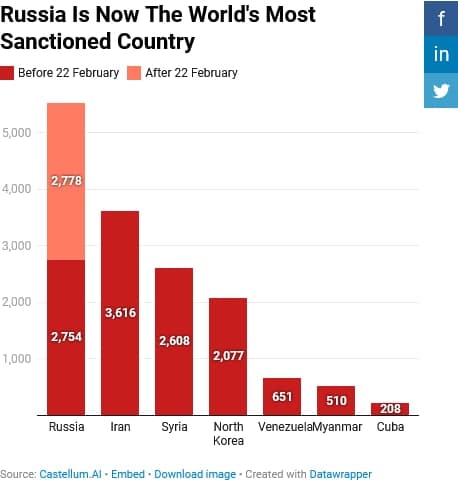RIO DE JANEIRO, BRAZIL – The impact of the war in Ukraine on the Brazilian economy came much faster than expected with the 24.93% increase in fuel prices announced yesterday by Petrobras.
The price adjustment had an immediate impact on public opinion and on groups supporting President Jair Bolsonaro, especially truckers, whose leaders are already cracking down on social media.
The price of cooking gas brings home the reverberations of the Ukraine crisis. Wars have always been a disruptive factor for a country’s economy, and this time it is even more true because of the globalized and interconnected world.
Economy Minister Paulo Guedes yesterday sought to minimize the impact of the fuel price adjustment, relying on measures taken under the amendment to the ICMS approved yesterday by the Senate: the creation of a fuel price stabilization account (CEP).
The proposal must still be approved by the House of Representatives, whose president, Arthur Lira (PP-AL), reacted sharply to the increase, saying, “I am amazed at Petrobras’ insensitivity to Brazilians – the true owners of the company. Today’s (yesterday’s) increase was a slap in the face for a country struggling to return to growth,” he said.
The measures will have inflationary effects that could neutralize the package of benefits the government is preparing to improve Bolsonaro’s approval ratings, especially the R$400 (US$80) Brazil aid that will benefit more than 18 million families. The 13 kg gas bottle for cooking, for example, will be corrected by 16.06% per kilo to R$58.21.
The government is running against time. Minister Paulo Guedes, together with the Minister of Mines and Energy, Bento Albuquerque, announced yesterday that the government is considering a special subsidy for diesel as long as the war in Ukraine continues.
Russia is one of the most important oil exporters in the world, and with the blockade of the country, the oil market is suffering a new shock, even if the United States increases its production.
The government hopes that the impact of the PIS-Cofins exemption for diesel fuel will soften the impact of the increase for now. “We will go by the situation,” Guedes said. “If the problem is solved in 30 or 60 days, the crisis would be more or less solved. Will the situation escalate now? Then, yes, you will start thinking about subsidizing diesel,” he explained.
GLOBAL CHAINS
This is an idyllic reading of the international situation. The economic sanctions imposed on Russia by the United States, Canada, England, and the European Union will have a much more lasting effect than the military conflict itself.
A negotiated settlement for peace does not mean that these sanctions will be lifted. President Vladimir Putin may even force a surrender from Ukraine, but he will not so easily wriggle out of what he has called an “economic war” with the West.

Never before have there been such harsh measures against a country’s economy. The blockade imposed on South Africa for apartheid doesn’t even come close. At that time, all American companies left the country because of the Civil Rights Act passed in the United States.
The same thing is happening now with Russia, but the scale of the reaction from major companies is much more serious, with all major product and service brands distancing themselves from the Russians.
Moreover, the restrictions on financial flows completely disrupt the integration of the Russian economy into global production and trade chains, which also affects relations with countries that do not impose sanctions, such as Brazil.
The situation is more isolated than in the days of the former Soviet Union, even during the Cold War. No one really knows how and if Russia will re-establish contact with the West, which is considered impossible with Putin in power.
More and more voices also fear that Russia is definitely turning away from the West.


